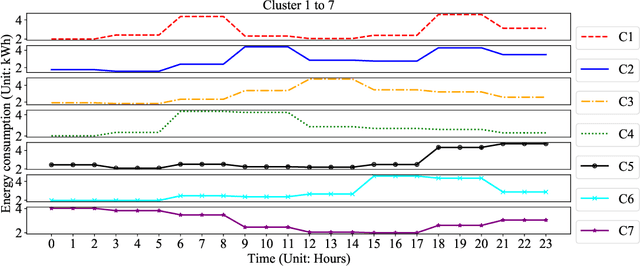Zhuo Wei
Model-Free Approach to Fair Solar PV Curtailment Using Reinforcement Learning
Dec 13, 2022Abstract:The rapid adoption of residential solar photovoltaics (PV) has resulted in regular overvoltage events, due to correlated reverse power flows. Currently, PV inverters prevent damage to electronics by curtailing energy production in response to overvoltage. However, this disproportionately affects households at the far end of the feeder, leading to an unfair allocation of the potential value of energy produced. Globally optimizing for fair curtailment requires accurate feeder parameters, which are often unknown. This paper investigates reinforcement learning, which gradually optimizes a fair PV curtailment strategy by interacting with the system. We evaluate six fairness metrics on how well they can be learned compared to an optimal solution oracle. We show that all definitions permit efficient learning, suggesting that reinforcement learning is a promising approach to achieving both safe and fair PV coordination.
Characterizing Residential Load Patterns by Household Demographic and Socioeconomic Factors
Jun 04, 2021

Abstract:The wide adoption of smart meters makes residential load data available and thus improves the understanding of the energy consumption behavior. Many existing studies have focused on smart-meter data analysis, but the drivers of energy consumption behaviors are not well understood. This paper aims to characterize and estimate users' load patterns based on their demographic and socioeconomic information. We adopt the symbolic aggregate approximation (SAX) method to process the load data and use the K-Means method to extract key load patterns. We develop a deep neural network (DNN) to analyze the relationship between users' load patterns and their demographic and socioeconomic features. Using real-world load data, we validate our framework and demonstrate the connections between load patterns and household demographic and socioeconomic features. We also take two regression models as benchmarks for comparisons.
 Add to Chrome
Add to Chrome Add to Firefox
Add to Firefox Add to Edge
Add to Edge